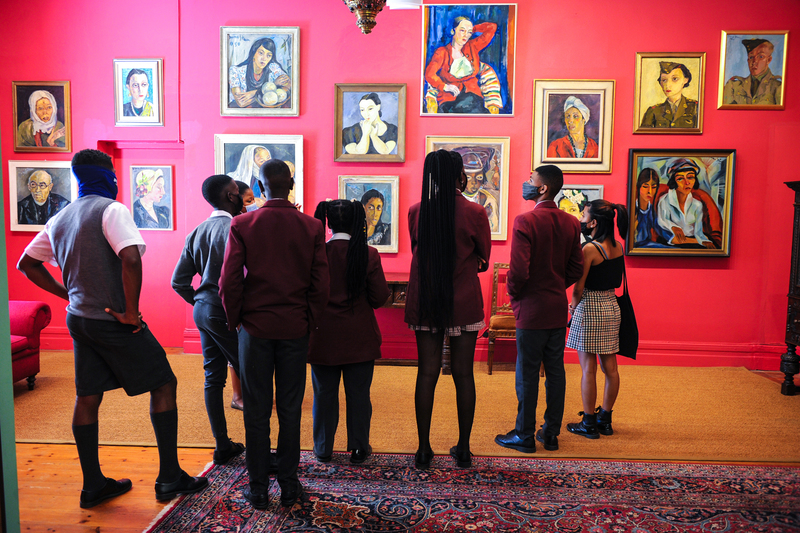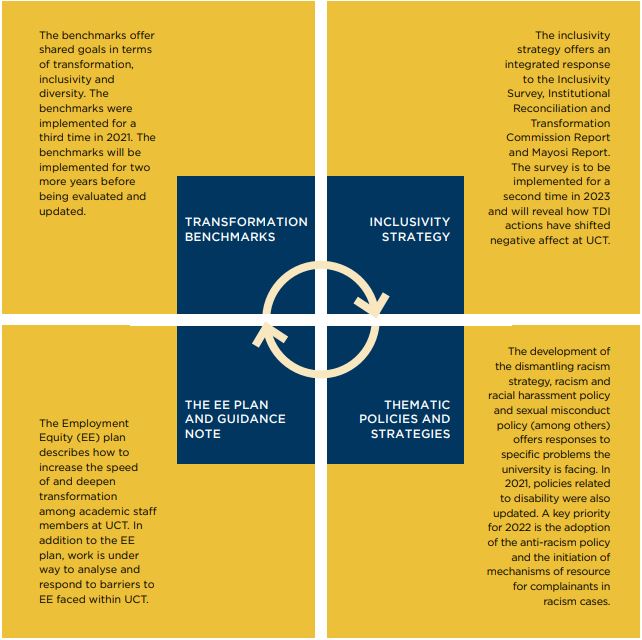Where to from here?
04 November 2022
The four pathways to transformation

Conclusion
The first three years of implementing the transformation benchmarks were challenging. At first there was the challenge of developing and rolling out benchmarks for an immensely diverse university. Secondly, there was the challenge of securing buy-in from transformation stakeholders, who initially viewed the exercise with suspicion. Thirdly, there was the challenge of creating and later updating the templates for collecting data on the benchmarks. Lastly, there is the challenge of collating a vast data set into manageable and useful takeaways for transformation stakeholders.
Even with these challenges, the benchmark exercise has been extremely useful. Over the first three years of implementing benchmarks, patterns are starting to emerge. While these patterns do not tell a simple story of progress or regress, they do offer suggestions of where progress is occurring, where gaps are widening, or where small and tactical actions are present. All of this is useful in assisting UCT, and possibly other entities, to think through not only monitoring and evaluating transformation, but also using the outcomes of the monitoring exercise to generate evidence-based interventions.
Recommendations related to each benchmark
 |
A Strategic integration of transformation | In order for transformation work to be effective, transformation agents need the resources, time and expertise to conduct transformation actions. Without resources, time and expertise, transformation work will continue to be events-based rather than programmatic. |
 |
B Student access, support and success | To be effective, transformation efforts must change the material/economic, social or political realities of students. Otherwise efforts focus solely on the rhetoric of transformation, rather than action. |
 |
C Staff access, support and success | To meet the minimum standards, more work needs to be done to support, empower and enable marginalised staff members, especially those labelled as “unskilled” or “semi-skilled”, to be able to meaningfully shape the organisation and grow within it. |
 |
D Place and space: language, names, symbols, artworks and identityersity | Focus on this benchmark has waned in each year since 2019. While COVID-19 might account for some of the reasons why this benchmark has been deprioritised, it is also possible that there are insufficient resources or programming for this area of work. More resources, time and effort need to be put into this benchmark area in the future. |
 |
E Institutional responses to discrimination, harassment and violence | There are strong institutional actions through the OIC, which seeks to dismantle racism and respond to SGBV. These actions do not always connect with faculties and departments (beyond the occasional training sessions). For this benchmark to be achieved, institutional efforts need to better connect with, support and enable actions at a faculty and departmental level. Similarly, faculties and departments need to prioritise actions in this area in 2022. |
 |
F Community engagement: anchoring UCT in community | It’s important for community engagement actions to be connected and to talk to each other as much as possible. It is recommended that the Transformation Forum holds a special seminar inviting the leads of community engagement initiatives to speak on their work, and creates a platform for exchange of knowledge, interrogation of ideas and learning on how power dynamics play out in this work. |
 |
G Curriculum support: decolonisation, marginalisation and accessibility | More actions that employ activist pedagogies, that counter curricula and challenge capitalist approaches to education may be needed. These would allow for transforming curricula to move beyond integrating social justice content to shifting power dynamics between students and lecturers, and between the university and the participants (as opposed to their current construction as “consumers”) in the processes of producing knowledge. |
 |
H Owning UCTʼs Afrikan identity | Efforts that seek to centre UCT’s African identity need to do so in a critical manner. In order to better meet this benchmark, UCT’s own positionality needs to be acknowledged, so that its efforts to centre its African identity disturb rather than accept systems of power on the African continent. |
 |
I Innovations, alternative approaches and best practices | Social justice work is always an experiment in that approaches should always be based on evidence and always need to be tested for their efficacy. It would be beneficial to create an incubator for transformation innovations. The incubator could assist faculties and departments to think of new and more effective ways to further TDI. |
 This work is licensed under a Creative Commons Attribution-NoDerivatives 4.0 International License.
This work is licensed under a Creative Commons Attribution-NoDerivatives 4.0 International License.
Please view the republishing articles page for more information.






